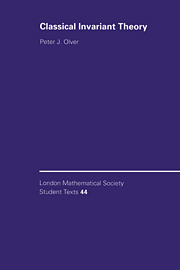Book contents
- Frontmatter
- Contents
- Introduction
- 1 Prelude — Quadratic Polynomials and Quadratic Forms
- 2 Basic Invariant Theory for Binary Forms
- 3 Groups and Transformations
- 4 Representations and Invariants
- 5 Transvectants
- 6 Symbolic Methods
- 7 Graphical Methods
- 8 Lie Groups and Moving Frames
- 9 Infinitesimal Methods
- 10 Multivariate Polynomials
- References
- Author Index
- Subiect Index
10 - Multivariate Polynomials
Published online by Cambridge University Press: 08 January 2010
- Frontmatter
- Contents
- Introduction
- 1 Prelude — Quadratic Polynomials and Quadratic Forms
- 2 Basic Invariant Theory for Binary Forms
- 3 Groups and Transformations
- 4 Representations and Invariants
- 5 Transvectants
- 6 Symbolic Methods
- 7 Graphical Methods
- 8 Lie Groups and Moving Frames
- 9 Infinitesimal Methods
- 10 Multivariate Polynomials
- References
- Author Index
- Subiect Index
Summary
We have now reached the culmination of our brief tour of the most noteworthy features in the invariant theory of binary forms and stand ready to launch into new and less well charted territories. Unfortunately, our space limitations prevent us from realizing this grander aim in any depth, but we do have room in this final chapter for a brief introduction to the invariant theory of homogeneous polynomials in more than two variables (along with their inhomogeneous counterparts). Not surprisingly, almost all of the classical — and not so classical — methods that have been developed for binary forms can be straightforwardly adapted to the multivariate situation. On the other hand, the required computations are considerably more involved, and much less is known about explicit bases for invariants and covariants, solution to equivalence problems, canonical forms, structure of symmetries, and so on.
Given a system of multivariate homogeneous polynomials or, more generally, functions, we may construct a wide variety of invariants and covariants by a combination of interrelated techniques, the most useful being modeled on the transvectant processes in conjunction with symbolic or transform methods. Since many of the tools are straightforward extensions of the bivariate versions that were developed in depth in the preceding chapters, we can pass very quickly through them. A significant complication is that, in addition to classical invariants and covariants, there exist nontrivial “contravariants” and “mixed concomitants”, which, unlike the case of binary forms, cannot be directly obtained by a simple determinantal reweighting. Furthermore, our graph-theoretic methods are not nearly as pleasant to devise or use, and so one must, typically, revert to the more involved (albeit more computer-friendly) algebraic manipulations.
- Type
- Chapter
- Information
- Classical Invariant Theory , pp. 228 - 246Publisher: Cambridge University PressPrint publication year: 1999



